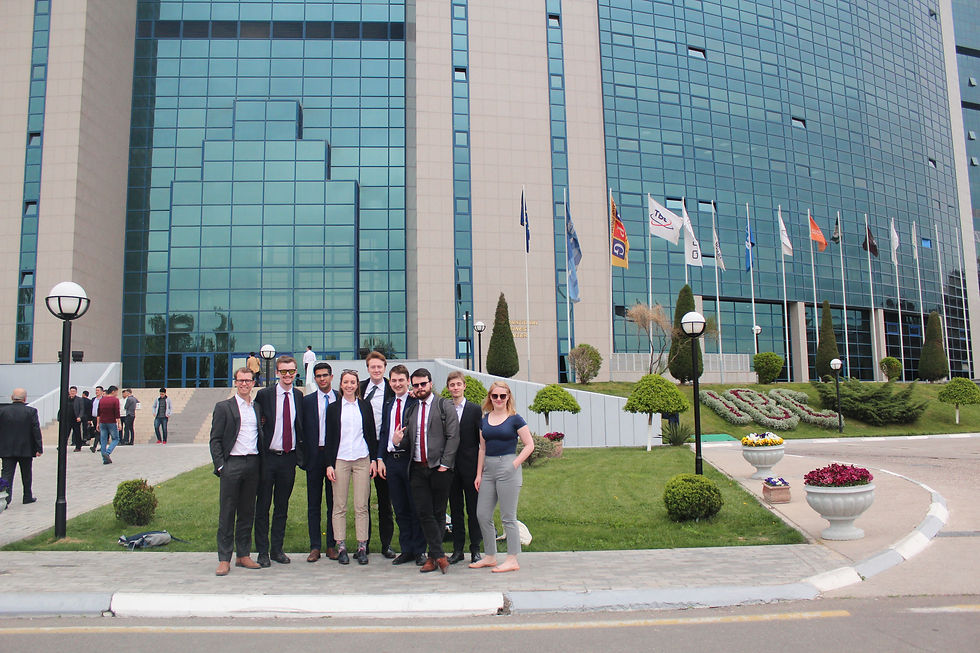Grimshaw Trip to Uzbekistan
- Grimshaw Club
- May 17, 2019
- 4 min read

At the end of March 2019, a delegation of students embarked on a journey to discover Central Asia: an unknown and isolated corner of the world torn between historic Soviet and Russian influence, increasing Chinese investments, and complex relations among the five Islamic republics.

Throughout our week-long trip, we had an eclectic set of activities and meetings to better understand the political, media and economic atmospheres of Uzbekistan as well as its rich culture and history that has its roots in the Silk Road and the immense Mongol Empire of Amir Timur. Starting with Tashkent, we met with journalists, the US Embassy, the EU delegation to Uzbekistan, the Ministry of Finance, the University of World Economy and Diplomacy, the ‘opposition’ People’s Democratic Party, and leading figures in the corporate world. After such an exhaustive yet insightful itinerary, we ventured on to the ancient cities of Samarkand and Bukhara, seeing a very different side to Central Asia, its beauty largely untainted by the repressive secular force of Soviet communism.
Read below some of the thoughts, experiences and take-aways from the trip from our delegates:

“Travelling to Uzbekistan was my first opportunity to experience and appreciate the challenges of 21st century state-building, in the generation following the collapse of the Soviet Union. In a wide series of meetings ranging from the US Embassy in Tashkent to Tashkent-based layers focusing on directing foreign investment into the country. The main takeaway for me was, despite the issues of political and economic reform the government still must face, is that Uzbekistan has de-Russified rapidly. With the new political leadership of Shavkat Mirziyoyev, the first post-Soviet leaders are attempting to bring Uzbekistan into the world order of the 21st century as a country with support from Russia, China and the United States. The most interesting aspect of the trip was the opportunity to meet peers at The University of World Economy and Diplomacy. As the first generation of Uzbeks to grow up outside of the Soviet Union, it was fascinating to hear their insights into International Relations and how they reflected to Western perspectives.”
Tárlach Russell – MSc History of International Relations

“After months of our delegation leader Eugene having slaved over building a fantastic Grimshaw trip for us lucky few, it took 10 hours of flying, covering 6,250km, to reach our final destination: Uzbekistan. A relatively under appreciated and unexplored central Asian republic, surrounded by a host of other ‘stans’ which too share its rich Soviet and Silk Road histories, few of us knew exactly what to expect. I, certainly, was further from home than I had ever been before, in more senses than one. General Uzbek friendliness and hospitality, a trade-mark of the country, did not disappoint! From meetings with lawyers, ministers and journalists, to entertaining and multilingual cultural exchanges with fellow train passengers, we all took away a vast amount from the trip, with the added bonus of these insights being composed of material which even a google search would not necessarily be able to uncover.

Since Uzbekistan’s liberal ‘opening up’ in 2016, its teething problems and growing pains are easy to see, but its vision for the future promises to usher in a new central Asian era: one of economic and political liberalisation, accompanied by international cooperation. This juxtaposition between pre-2016 and now was emphasised by everyone with whom we met, along with the crucial element that Uzbekistan would not align itself with one great actor or another (in this case, probably either Russia or China), but dares instead to navigate its way through its troublesome teenage hood to an independent, self-dependent adulthood. Uzbekistan takes on this bold challenge with renewed vigour, but not without its insecurities as it aims to enter into competitive spheres in an already rather developed world, as evidenced by the ever-persistent questions fired at us even from politicians of ‘do you have any suggestions?’ Whichever path it chooses to pursue in the coming years, one thing is clear: like its somewhat confused culture, Uzbekistan needs to carve out its own niches on the global stage in order to thrive with full potential.”
Sophie Rieckmann – BA History

The trip was at many times quite a surreal experience. The first thing I witnessed immediately upon leaving the airport was our taxi driver asking ‘how much do you want to pay’. Haggling over taxis and at markets was a skill that we all trained with practice. Over the course of our stay, the national currency of ‘som’ devalued from around 8350 to the US dollar to 8450 to the US dollar, making for some very interesting exchanges later in the week. Sitting in a conference room with around 20 Uzbek students and a professor discussing our two education systems was quite bizarre, as was the grandiose feel of the Ministry of Finance meeting, as senior staff directed us through the country’s foreign investment, credit markets and pension schemes to great detail, and much to the delight of our finance student delegates. Above all, visiting Uzbekistan gave us so much to remember for the rest of our lives. As a group we bonded over the week and were enjoying the last days of our stay as dear friends who had experienced so much together. If there is one clear take-away from it all, it is that you should make time to see Uzbekistan and Central Asia for yourself, and embrace a world that’s so unique, and with an exciting and intriguing future ahead of it.
Eugene Gurin – BSc International Relations and History
































Comments